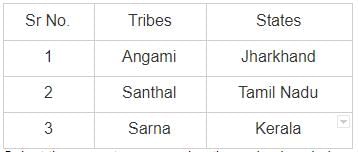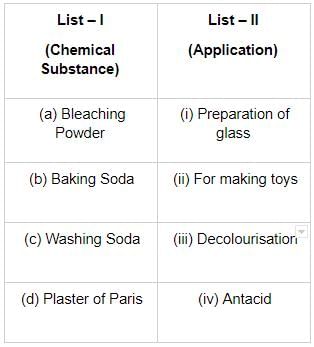UPPSC GS I Practice Test - 8 (Old Pattern) - UPPSC (UP) MCQ
30 Questions MCQ Test UPPSC Mock Test Series 2025 - UPPSC GS I Practice Test - 8 (Old Pattern)
Which one of the following is the most popular city or urban agglomeration by population in India?
Which schedule of the Indian constitution has details about language?
| 1 Crore+ students have signed up on EduRev. Have you? Download the App |
Which among the following hosts 'Global Vaccine Summit' on 4th June 2020?
Tropical vegetation can be found in which of the following national parks?
1. Nandadevi National park
2. Khangchendzonga National Park
3. Balphakram National Park
Select the correct answer using the code given below.
Who was the scientist who discovered blood circulation?
Which of the following pairs is/are correctly matched?

Select the correct answer using the code given below.
Rajiv Mehrishi committee, recently seen in the news, is related to
Which of the following is one of the primary objectives of MNREGA?
Whose book title 'I do what I do' was recently released?
Which the State of India touches maximum State boundaries?
Which of the following country to host the G20 Summit in 2023?
______species are NOT in the IUCN classification of threatened species.
Which among the following is NOT a recipient of the 2020 Nobel Prize in Physics?
India's first sugar mill was established, in the year_____at _______.
According to new research, which country leads the world in plastic waste creation and among the top marine polluters?
Which of the following sectors are included in the Production-Linked Incentive.
1. Advance Chemistry Cell (ACC) Battery
2. Automobiles & Auto Components
3. Textile Products (MMF segment and technical textiles)
Select the correct answer using the code given below
In Sep 2020, who among the following were conferred the Lifetime Achievement Awards by the World Digital Awards first edition in India?
Which of the following regions has maximum biodiversity?
Kamala Harris has made history by becoming the first woman vice president of which of the following countries?
Match List – I with List-II and select the correct answer by using the codes given below the list:

Who has won for Mercedes at the Austrian Grand Prix in July 2020?
Which Indian Act provided for the first time a separate electorate division for the Muslim community?
Emissions from which of the following sources can cause acid rain?
A) Volcanoes
B) Swamps
C) Plankton in the ocean
D) Power generation from fossil fuels
Which of the following supercomputers of India has been ranked 63rd in the Top500 list of most powerful supercomputers in the world in November 2020?
Biological Oxygen Demand (BOD) is a standard criterion for
Which of the following states won four awards in the fisheries sector from the National Fisheries Development Board operating under the Ministry of Fisheries?
Consider the following sentences:
1. Sacred groves are forest fragments having significant religious values.
2. The gharial is listed as a threatened species in IUCN Red List.
3. Indian Rhino Vision is launched by UNFCCC.
Select the correct answer using the code given below
Which among the following options regarding BrahMos Missile is not correct?
|
2 docs|37 tests
|












